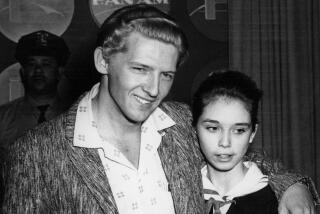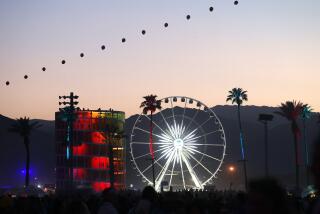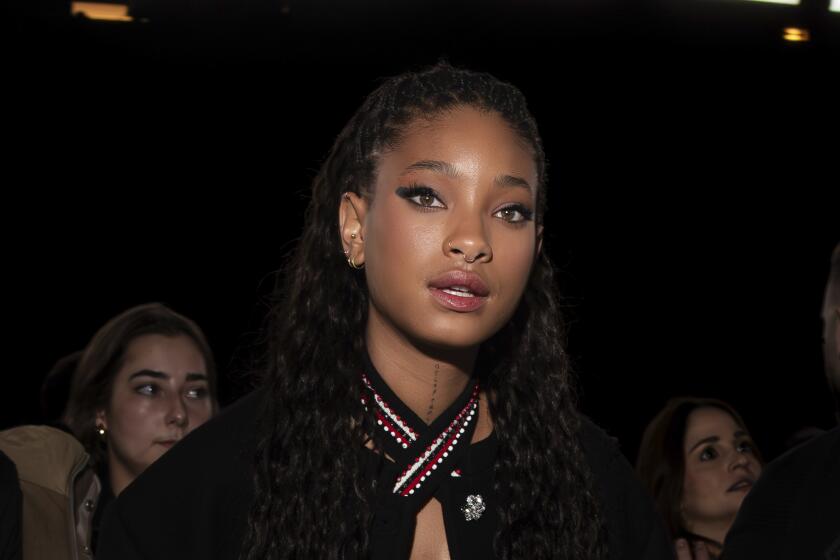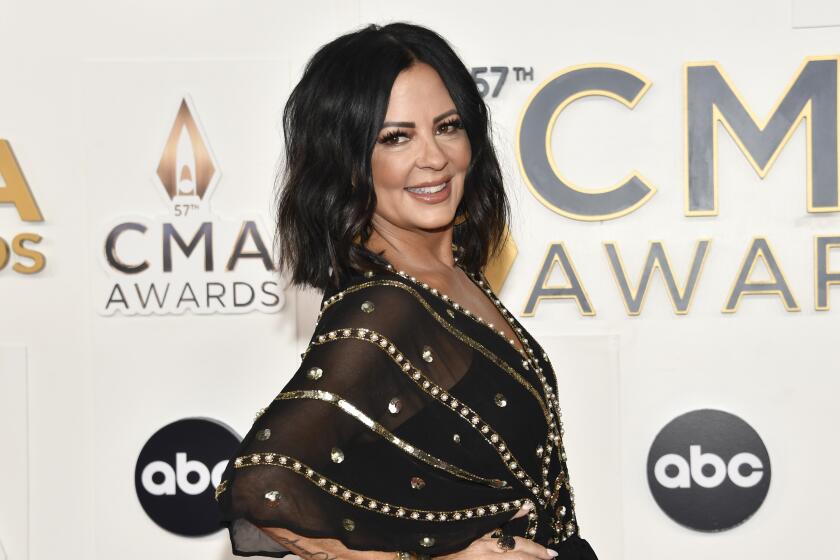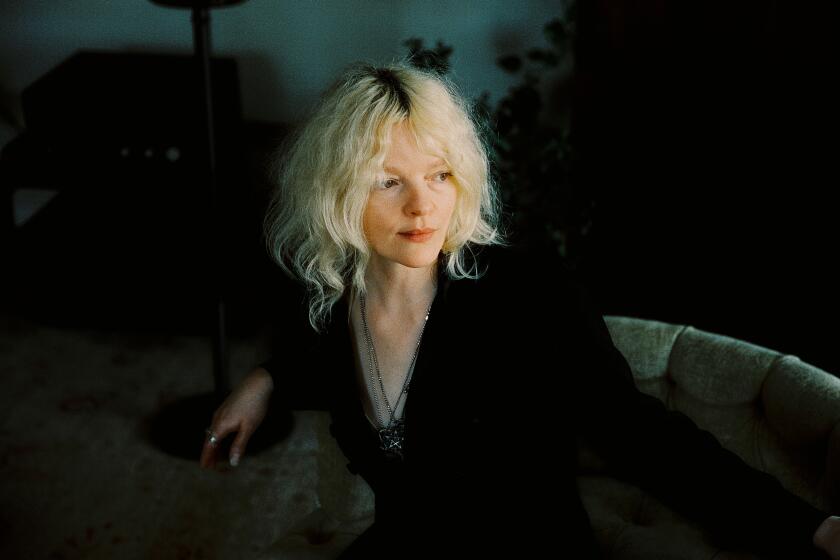Hootie Is Too Meager to Please
Every so often, a bar band hits the lottery.
For Hootie & the Blowfish, the latest group of lucky rock yeomen with a huge-selling album, the jackpot has never been bigger. But for lovers of the bar-rock tradition, with its sweat, its in-your-face energy, its love of stagecraft and its sense of cut-loose passion and fun, the rewards have never been more meager.
The roll of long-suffering bar-bands-made-good begins in the early ‘70s with the J. Geils Band, an epitome of onstage ferocity and rowdy swagger. In the ‘80s, Huey Lewis & the News escaped the dives on the strength of catchy, upbeat music and a carefree air of bonhomie that came through clearly in its shows. Now comes Hootie, the South Carolina foursome that had knocked it out since the late ‘80s on the Southern bar circuit before breaking through with “Cracked Rear View,” a national debut album that by SoundScan’s reckoning has sold 9.1 million copies since its 1994 release. While some observers with foolish expectations see the 1.8 million sales of this year’s follow-up, “Fairweather Johnson,” as a flop, Hootie is still one high-riding bar band.
But sitting (most of the crowd found scant reason to stand) through the band’s tepid performance Sunday night at Irvine Meadows, it was hard to fathom how Hootie & the Blowfish ever survived years in the dives, where the clientele usually demands hot action. The fans back in the bars must have gotten far better shows than Hootie put on for the near-capacity 15,000 fans in Irvine. The performance was the definition of dullness until it registered a few vital signs at the end. Not until an energized closing rendition of the Doobie Brothers’ nugget “Long Train Runnin’ ” (with expert help on banjo and fiddle from Bela Fleck and Sam Bush of the virtuosic opening act, the jazz fusion-bluegrass Bela Fleck & the Flecktones) did Hootie muster the vitality of barroom achievers.
The headliners spent most of their nearly two-hour set playing competent, to-the-note renditions of songs from the two albums, adding not the slightest spark that could give the material an in-the-moment life of its own. Singer Darius Rucker may be the first soul-influenced rocker who has more in common with the shy, introverted, “shoe-gazer” school of British alt-rock performance than with firebrands such as Otis Redding and Mitch Ryder.
On the opening number, “Be the One,” Rucker was at his most animated, his body pumping with effort as he (over)sang the dark, pleading number in a deep, muscular, husk-it-out voice. But Rucker had stationed himself in the shadows next to the drum riser, as far as possible from the spotlight and from the audience he was supposed to be trying to reach. He pulled the same kind of retreat on “Tootie,” an encore ballad he said “means a lot to me”--but evidently not enough to sing it from a spot on the stage that would maximize his chances of connecting with the crowd. Rucker wore a baseball cap pulled over his eyes, which was a terrible idea; if the eyes are the windows of the soul, this would-be soulful singer wasn’t interested in giving his fans much of a peek.
Rucker’s voice was powerful but one-dimensional and repetitive, falling into a predictable range and emotional tone. Hootie has been big on jock imagery (guitarist Mark Bryan, the politely banal onstage spokesman, was at his most animated when proclaiming a dislike for the Dallas Cowboys). The image one got listening to Rucker was that of a three-yards-and-a-cloud-of-dust fullback who is reliable enough plunging straight into the line. But exceptional singers are daring, darting tailbacks, with varied, unpredictable moves that carry them to the ultimate pay dirt: an emotional end zone of complex, sometimes conflicting, shades of feeling. Rucker’s straight-ahead approach yielded no touchdowns.
Perhaps we get the bar-band breakthroughs that the times demand. J. Geils was just right for the hedonistic ‘70s; the unrelenting good cheer of Huey Lewis fit the Reagan era. Hootie & the Blowfish is a bar band for the Prozac nation. Most of its songs are about loss and uncertainty, but they come across with a gentle, reassuring touch. The tone of the songs suggests that, though there isn’t much to be done about these troubles, the edge can be taken off and they can be handled and survived.
Rucker’s voice and the smooth harmonies of band mates Bryan, Jim Sonefeld and Dean Felber are like a comforting pat on the back, telling us that we can have a good cry and move on. Great pop wrestles and claws with tough realities and keeps its edge.
Still, there can be value in less ambitious music that seeks only to comfort and sustain. Despite the general critical shelling Hootie has taken, its songs do have some modest merit. The success of “Cracked Rear View” isn’t so shocking, given the big, catchy, oft-repeated choruses of such crowd-pleasers as “Let Her Cry,” “Only Wanna Be With You” and “Hold My Hand.”
On “Fairweather Johnson,” the band is less blatant about outfitting each song with a big chorus hook, which might account for sales being merely bountiful, rather than once-in-a-lifetime stupendous. The better new songs include “Sad Caper,” the band’s next single, which offers an attractive mixture of early-R.E.M. jangle and Beatles-like harmony; “Earth Stopped Cold at Dawn,” a persuasive lament; and the brisk “Silly Little Pop Song,” featuring “ooh-la-la-la” harmonies that are a direct swipe from the Beatles’ “You Won’t See Me.”
These appealing “Johnson” songs provided some of the concert’s rare fair weather and suggested that the album could have more legs than critics eager to bury Hootie would suppose. But if the band can’t put some action, personality and unpredictability into its live shows, it will deserve to be buried in the bars again, and soon.
More to Read
The biggest entertainment stories
Get our big stories about Hollywood, film, television, music, arts, culture and more right in your inbox as soon as they publish.
You may occasionally receive promotional content from the Los Angeles Times.

